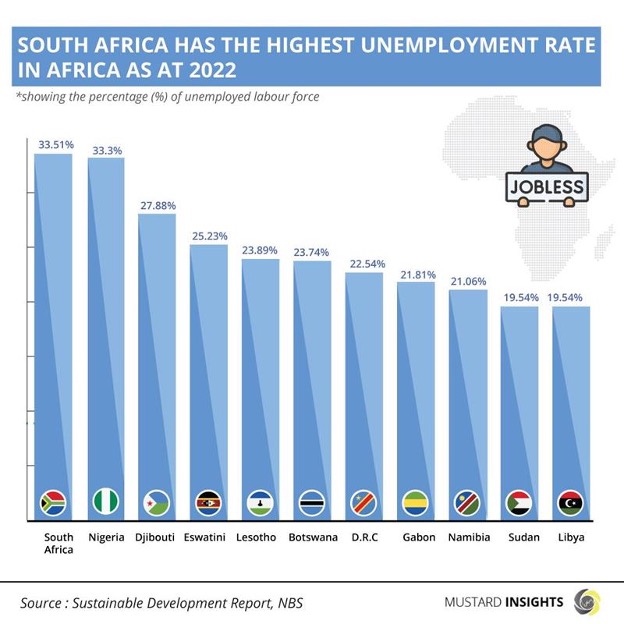Unemployment continues to persist in African countries as universities churn out more graduates without readily available jobs to accommodate them. This challenge has seemingly birthed a double-edged impact as individuals seek out other means of sustenance, both good and bad – towards crime or towards entrepreneurship.

Unemployment continues to persist in African countries as universities churn out more graduates without readily available jobs to accommodate them. This challenge has seemingly birthed a double-edged impact as individuals seek out other means of sustenance, both good and bad – towards crime or towards entrepreneurship.
Unemployment can be caused by various reasons such as high-interest rates, recession, technological change, structural mismatch of skills, and more. In this article, we shall be taking a look at the African countries with the highest unemployment rates according to data from a Sustainable Development Report as of 2022.
South Africa and Nigeria Have the Highest Rates
South Africa and Nigeria ranked first and second respectively with the highest unemployment rates in Africa. Conversely, they also recorded the highest number of tech startups in Africa, according to the FDI African Tech Ecosystem of the Future 2021/2022 ranking, with Nigeria having the highest volume of startups, while South Africa followed in second place. This increase in startups may also be a result of the limited employment opportunities in Africa. African startups also raised $2.25 billion in the first quarter of 2022 alone, making it the highest amount of funding received in over seven years. Visit Mustard Insights for more.
South Africa has struggled with unemployment for decades now, and although the government of South Africa says it is making strides to amend the issue, there is still a large gap between the employed, unemployed, and unemployable. South Africa topped the ranks as the country with the most unemployment with an index score of 33.51 percent. Between the early ‘90s till date there seems to be little to no improvement on this issue, with data from the South African Department of Communications showing that the unemployment rate stood at 31.5% as of 1994 and stood at 35.1% as of 2014.
The impact of this issue has largely been felt more by women and young people. According to the data from StatsSA, black African women are the most affected by unemployment in South Africa, with a rate of 41%. Young people aged 15-24, and 25-34, also recorded high unemployment rates of 64.4% and 42.9% respectively, with numbers pointing upwards.
Sustained economic disruption from Covid-19, austerity measures, persistent inequality, and poor government policies have all been cited as contributors to the weak numbers (Quartz). South Africa’s inflows of foreign investment, a key enabler in employment prospects, also declined by 39% to $3.1 billion in 2020 according to data from moneytransfers.com.
Nigeria was dubbed the Giant of Africa due to its economic prowess decades ago but can’t seem to find a balance for employment in recent years. The country placed second on the list with an index score of 33.3%. Nigeria’s unemployment issues can easily be attributed to bad governance and corruption. Bad governance has led to the decline of all major sectors in Nigeria, which has had adverse consequences on the employment and survival of its citizen. Corruption also has plagued the government of Nigeria, as funds that are meant to be used to build facilities and empower its population are used by government officials for personal purposes.
According to data from Trading Economics, Nigeria scored 24 points out of 100 on the 2021 Corruption Perceptions Index reported by Transparency International. The Corruption Perceptions Index ranks countries and territories based on how corrupt their public sector is perceived to be. A country or territory’s score indicates the perceived level of public sector corruption on a scale of 0 (highly corrupt) to 100 (very clean). This shows how much corruption has to play in the Nigerian ecosystem.
Other Metrics
Djibouti placed third on the list with an index score of 27.88%.
Eswatini ranked fourth on the list with an index score of 25.23%.
Lesotho ranked fifth with an index score of 23.89%.
Botswana placed sixth with a score of 23.74%.
D.R.C placed seventh on the list with an index score of 22.54%.
Gabon ranked eighth on the list with a score of 21.81%.
Namibia, Sudan, and Libya were in the bottom third of the list.
Takeaway
Africa needs to do a lot more to curb this issue of unemployment in its communities. If there are employment opportunities, highly skilled professionals that have left the continent to seek employment elsewhere will return. It will provide income for households living below the poverty mark and also stimulate economic growth.
Thoughts?
We won't share your email address. All fields are required.
